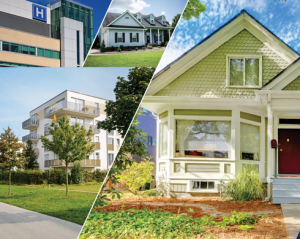By HUD
Photos: HUD
WASHINGTON – The U.S. Department of Housing and Urban Development (HUD) recently announced that it has entered into an historic Conciliation Agreement with The Appraisal Foundation (TAF), an organization responsible for setting standards and qualifications for real estate appraisers and providing voluntary guidance for all industry valuation professionals. This Agreement resolves a Secretary-initiated complaint against TAF alleging discriminatory barriers preventing qualified Black people and other persons of color from entering the appraisal profession on the basis of race in violation of the Fair Housing Act. Read the Conciliation Agreement here.

According to the Bureau of Labor Statistics’ 2023 data, the property appraisers and assessors’ occupation was 94.7% White and 0.6% Black, ranking as the least racially diverse of 800 occupations surveyed. As the Interagency Task Force on Property Appraisal and Valuation Equity (PAVE) makes clear, “[t]he lack of diversity within the appraiser workforce can contribute to patterns of mis-valuation in communities of color.” These patterns have been well-documented. According to 2021 research by Fannie Mae, 12.5 percent of appraisals for home purchases in majority-Black neighborhoods and 15.4 percent in majority-Latino neighborhoods result in a value below the contract price (the amount a buyer is willing to pay for the property), compared to only 7.4 percent of appraisals in predominantly white neighborhoods. This pattern of undervaluation can contribute to the racial wealth gap. Today, the median white family holds eight times the wealth of the typical Black family and five times the wealth of the typical Latino family.
The complaint states that one of the reasons for the lack of diversity in the appraiser workforce is TAF’s experience requirement. This requirement allegedly causes aspiring appraisers to rely heavily on identifying a friend or family member who is already a licensed appraiser and willing to supervise on-the-job experience hours for licensure, thus perpetuating the homogeneity of the profession. PAVE identified this experience requirement as a significant barrier to entry for underrepresented and disadvantaged groups, including Black people and other people of color. The agreement provides, among other items, for increased funding for an alternative, more inclusive path for fulfilling the experience requirement. These new requirements bring us closer to correcting historic discriminatory patterns in the appraisal industry.
“To help eliminate racial and ethnic bias from home appraisals, we must ensure that the industry looks like America,” said HUD Acting Secretary Adrianne Todman. “Today’s historic agreement will help build a class of appraisers based on what they know instead of who they know. This settlement will help bring us one step closer to rooting out discrimination in housing and opening doors to opportunity for all.”

“HUD’s agreement requires policy changes that expand the pathways to becoming an appraiser, a change that will promote greater inclusion of Black people and other persons of color who have been the least likely to gain access to this industry,” said Diane M. Shelley, HUD’s Principal Deputy Assistant Secretary for Fair Housing and Equal Opportunity. “This is a groundbreaking agreement, and I am grateful to Demetria McCain, who, during her tenure as Principal Deputy Assistant Secretary of FHEO, launched the investigation and secured this conciliation addressing systemic issues that have perpetuated unacceptable inequities in the appraisal industry.”
“Homeownership remains perhaps the biggest driver of a wealth gap that reflects wide racial and ethnic disparities in both the rate of homeownership and the financial return associated with owning a home,” said Melody C. Taylor, Executive Director of PAVE. “This Agreement reflects a major step forward in the journey to cultivate an appraiser profession that is well trained and supports the tenets of equal opportunity for all.”
Under the terms of the Agreement, The Appraisal Foundation is required to establish a $1.22 million scholarship fund, which will be utilized to cover the cost of aspiring appraisers to attend Practical Applications of Real Estate Appraisal (PAREA) programs. The PAREA program is designed to provide an alternative pathway to fulfill the experience requirement to become a state licensed appraiser. The scholarships will cover the cost of the program, which will further encourage entry into the profession. The Agreement also includes terms for marketing the PAREA program and the scholarship fund to diverse communities as well as terms for evaluating the marketing’s effectiveness to those communities and persons of color aspiring to be appraisers. In addition, the Agreement includes terms for collaboration with state and territory appraiser regulatory agencies for PAREA’s adoption and credit towards the experience requirement for licensed appraisers.
Although HUD did not issue findings prior to entering into the Agreement and the Agreement does not constitute admissions by The Appraisal Foundation or evidence of a final determination by HUD of violations of the Fair Housing Act, or any other laws based on the investigation, it is an enforceable agreement intended to resolve the issues raised in the Secretary-initiated complaint.
People who believe they are the victims of housing discrimination should contact HUD at (800) 9669-9777 (voice) or (800) 927-9275(TTY). Additional information is available at https://www.hud.gov/fairhousing.
For more information on PAVE’s efforts to end bias in home valuation, visit https://pave.hud.gov/. To read the full PAVE Action Plan, visit https://pave.hud.gov/actionplan.

More information about HUD and its programs is available at www.hud.gov and https://espanol.hud.gov.





